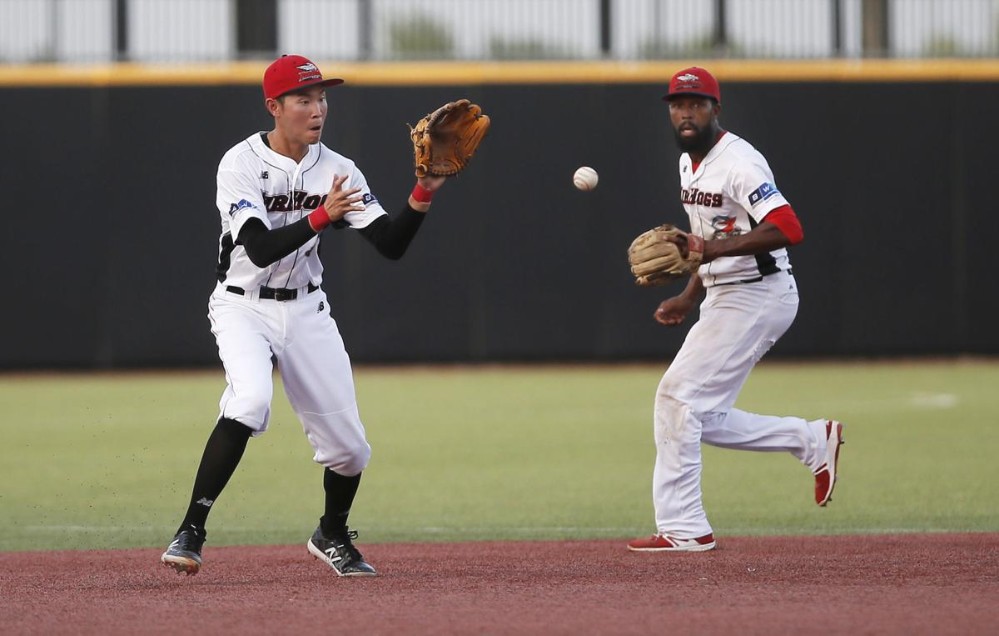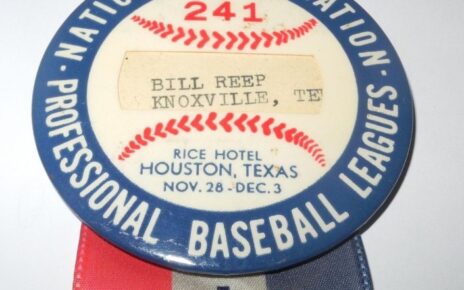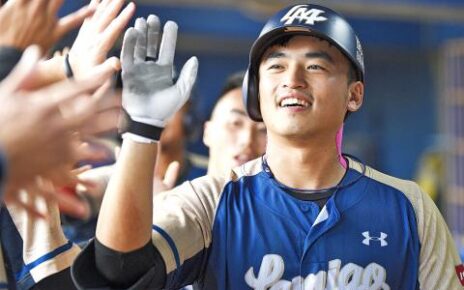One of the best things about baseball is the chance of seeing something new. Whether it’s watching a game in person, via a stream, or reading about the history of the greatest sport in the world the chance for discovery is always present. Sometimes it’s obvious, while at other times the discovery is unexpected. Kind of like turning on an American Association TV stream of your local AA ballclub, the Milwaukee Milkmen, to discover that the team they are playing against has a rather large pool of Chinese baseball players.
That was the situation earlier this year when I watched the Milkmen square off against the Texas AirHogs. On the broadcast out of Texas, I was watching a team with only a handful of domestic players and a boatload of Chinese players. I had no idea what I was watching as truth to be told, I hadn’t seen an AirHog game the previous year and had only expanded my AA horizons this year as I became more and more interested in the unaffiliated, or independent, baseball scene. What was I watching and how did we get here?
The background of the situation is pretty simple, the Chinese Baseball Association wanted to find an avenue for their best and brightest players to get better. The China Baseball League struggled throughout its existence, and even with the recent announcement that Major League Baseball has signed a deal to help revamp and relaunch the CBL the truth of the matter is that the CBL is years away from helping the CBA to field quality international teams. The reason is simple, you can only be as good as who you are playing against. In a league that usually consisted of 4 teams and played roughly a 30 game schedule that’s not offering much of an opportunity at in-game improvement. Rather than staying stagnant, the CBA sought a foreign outlet for their players.
Enter the AirHogs and majority owner Donnie Nelson, he of Dallas Mavericks fame. With his history of doing business with the Chinese sports machine, the AirHogs were in a favorable position. He was able to broker a deal with the CBA that would see the AirHogs get around 25-30 CBA players to put on the AirHogs roster each season. According to AirHog’s General Manager Nate Gutierrez, the process is pretty simple but also involved. Before the season the AirHogs send the manager and various coaches/front office staff to China where they watch the players the CBA’s preferred players work out. The CBA offers their input, but ultimately the AirHogs decide what players they want and what players will be staying behind.
For the CBA this is a simple issue of wanting to better compete on an international scale. Yes, they would like the CBL to return and be a quality league. Beyond that, they want to be able to field a Chinese national team that can compete at the Olympics and other world events. The AirHogs partnership allows for their players of the future to get better right now. It introduces them to a higher level of baseball, a more traditional routine of practice, and game situations they were not getting back at home. The goal is to have the youngsters on the AirHogs this season lead the Chinese national team in 3-4 years. A lofty goal, but one that should be attainable based on the results I witnessed from the AirHogs throughout the year.
I was surprised to learn that once the players are on the AirHogs roster the CBA has no say in how they are used. At least three of the AirHogs coaches are from China and help to guide the players. Ultimately though it is up to Manager Chris Bando and his staff to put the AirHogs’ imports in the best positions to succeed. The AirHogs select the players they think will best help them to win, but they also try to gauge which players seem like they will benefit the most from the time playing in the AA. This is a partnership after all. The AirHogs’ first commitment is to fielding a winning ballclub. At the same time, they are committed to helping to foster the growth of the game of baseball in China. This means that some of the players they bring with them will never see game action. They are with the team to practice and to get better for the future, not to help the AirHogs win in the here and now.
Guttierez acknowledges that with the CBA players mainly being defense-first fielders or control pitchers the need is still present for a good assortment of domestic players on the roster. Players like Javion Randle are brought on board because they are good ballplayers who fill a need (usually either a power arm or a power bat) and are also willing to work with the young CBA players on the game of baseball. Friendships and bonds form out of this relationship and the AirHogs are especially fond of the way the domestic players have been open and welcoming to their Chinese brethren.
Were you to go to the housing of the CBA players you’d notice stereotypical 18 to 23-year-old guys. They play video games, they love going to shopping malls, and they pal around with one another and their domestic teammates. The Texas heat has taken some getting used to, as has the compact and arduous playing schedule that is a staple of the AA circuit. Fans across the AA have responded kindly to the CBA players, though Guttierez is upfront that there have been some negative encounters. That is unfortunate to hear because the CBA is entrusting us Americans with their young players and it is our responsibility to treat them like they belong. Most have though, and when they don’t the CBA players have each other and the friends they have made stateside to help them out.
Gutierrez and the AirHogs aren’t fearful of the new MLB partnership with the CBL. They’re smart and realize that baseball is a global game and that China will benefit from continuing the AirHogs partnership even while laying the groundwork for their new relationship with MLB. The CBA players are the ones who matter the most, they are the lynchpins of baseball in China and the current AirHogs team. They are helping the AirHogs to try something different and form a long-lasting relationship that should be very beneficial to both organizations. Deep in the heart of Texas, the AirHogs have made a group of Chinese youngsters feel right at home while potentially helping to change the state of baseball on the international scene. Baseball is great like that.
Lead photo courtesy of Brandon Wade – Associated Press




